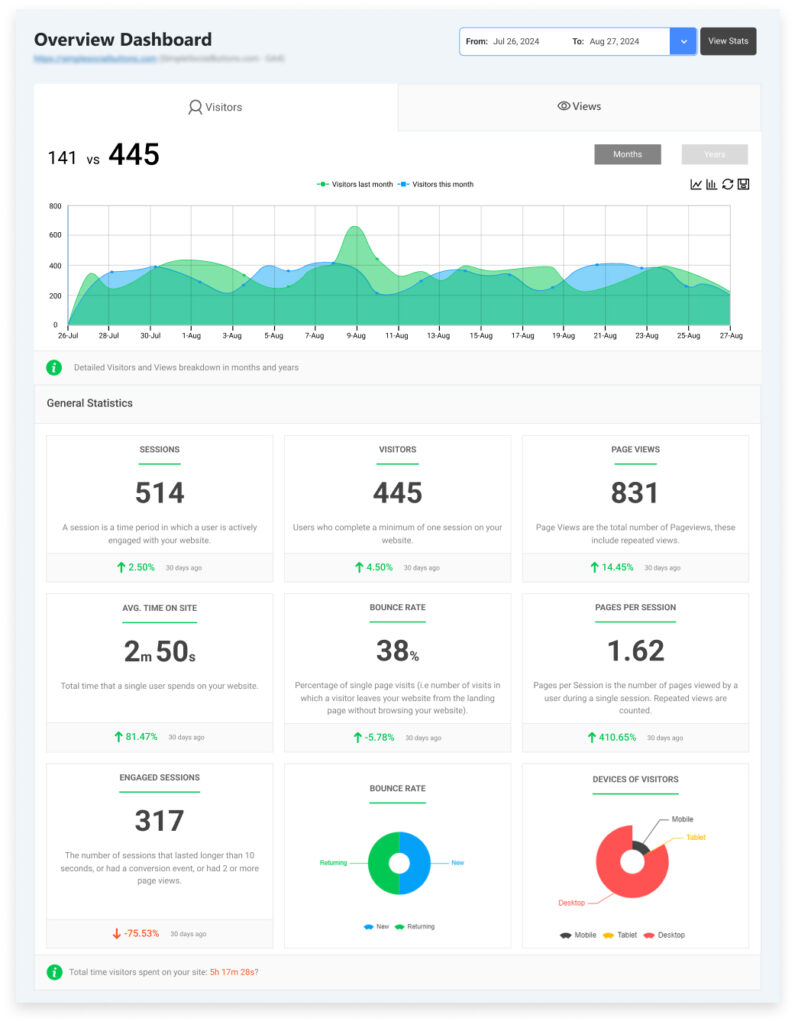
How to Master AI Search Engine Optimization (2026)
AI Search Engine Optimization is transforming the digital landscape, and businesses that fail to adapt may risk falling behind.
With search engines evolving rapidly, powered by AI algorithms that focus on user intent and contextual relevance, understanding how to optimize your content for these advanced systems is essential.
Recent studies show that AI-powered search engines now influence over 50% of online searches, and this number is only set to increase.
In this article, you’ll learn about AI Search Engine Optimization, why it’s becoming crucial in 20256, and how you can use AI technologies to stay ahead of your competition in AI search.
AI Search Engine Optimization (TOC):
What is AI Search Engine Optimization?
AI Search Engine Optimization (AI SEO) refers to the process of optimizing your website and content to align with the AI algorithms used by search engines like Google, Bing, and others. Unlike traditional SEO, which focuses on keyword matching and link-building, AI SEO leverages advanced technologies such as generative AI, large language models (LLMs), and semantic search to understand and rank content based on context and user intent.
Generative AI search engine optimization moves beyond keyword density and instead focuses on delivering high-quality, user-centric content that answers users’ queries in a meaningful way.
This shift is important for your business if you’re seeking to maintain visibility as AI continues to evolve.
Key AI Technologies in SEO
Let’s see the prominent AI technologies in SEO!
Generative AI
Generative AI refers to AI models like GPT-3, GPT-4 and Jasper AI, which can create high-quality content automatically. These models generate text based on specific inputs, such as SEO goals and keyword strategies, helping marketers generate relevant, keyword-rich articles, blogs, and other content forms. By automating content creation, generative AI tools streamline the content optimization process, saving businesses time and resources while improving SEO performance.
Large Language Models (LLMs)
Large Language Models (LLMs) like GPT-3 and Google’s BERT have revolutionized how search engines process content. LLM is capable of understanding the deeper meaning behind a search query, allowing search engines to evaluate content based on semantic search. Instead of focusing solely on exact keyword matches, LLMs analyze content for its relevance, quality, and ability to answer user intent. This makes SEO more about context and comprehensiveness than just filling content with keywords.
Why AI SEO is Important in 2026
Here is why you must adopt search engine optimization AI!
- Search engines are increasingly relying on AI to understand user intent and provide more relevant search results. For example, Google’s BERT and MUM algorithms use AI to analyze search queries and rank content based on context, rather than just keyword matches. In this environment, AI SEO helps businesses ensure that their content is well-optimized for these sophisticated algorithms.
- As more businesses embrace AI SEO, it’s becoming clear that those who fail to adapt may fall behind. Optimizing content for AI search engines is no longer a choice but a necessity for maintaining search visibility and staying ahead of the competition.
- AI and LLMs have enabled search engines to understand the intent behind a user’s search, moving away from purely keyword-centric SEO strategies. Rather than focusing on inserting exact-match keywords, businesses must now focus on creating content that answers a user’s query in a meaningful way. This shift requires a deep understanding of user behavior and preferences.
- AI-driven search engines are capable of generating more accurate, relevant, and context-rich search results. With the help of LLMs and other AI technologies, search engines can evaluate a piece of content based on its relevance to a query, rather than just its keyword density.
- Search engines like Google BERT utilize deep learning and neural networks to enhance their ranking algorithms. These algorithms are designed to evaluate content in a more human-like manner, understanding context, relevance, and user intent to deliver more accurate search results.
Why You Should Care About AI SEO?
Enhanced User Experience
AI search engines prioritize content that improves the user experience. By optimizing for AI SEO, businesses can ensure that their content is not only relevant but also engaging, leading to better user satisfaction and higher engagement rates.
Future-Proofing Your SEO Strategy
Businesses that optimize their content for AI will gain a competitive edge. As search engines continue to evolve and AI-driven algorithms become more prevalent, early adopters of AI SEO will be well-positioned to maintain top rankings.
Increased Efficiency and Automation
AI tools can automate many time-consuming SEO tasks, including content creation, keyword optimization, and SEO audits. This reduces manual effort and allows marketers to focus on strategy and creativity, while AI handles routine tasks.
How to Optimize Content for AI Search Engines (Key Techniques)
To succeed in the era of AI-driven search engines, you need to go beyond traditional SEO practices and implement advanced techniques that align with AI algorithms.
Here are the key techniques for optimizing your content to rank higher and engage users more effectively in AI search engines.
1. Optimizing Content for AI Search Engines
Create High-Quality, User-Centric Content
AI search engines prioritize content that addresses user intent and provides relevant, high-quality information. Gone are the days when SEO was primarily about stuffing content with keywords. Today, AI algorithms, especially Generative AI and LLMs like GPT-3 and BERT, focus on understanding the deeper meaning and context of the content.
How to Optimize:
- Focus on Intent: Understand the purpose behind the user’s search query. Are they looking for informational, transactional, or navigational content? Tailor your content to answer those queries thoroughly.
- Use Natural Language: Ensure your content is written in a conversational tone, aligning with how users interact with search engines. This approach is especially important for semantic search, where AI evaluates content based on meaning and context rather than just keywords.
- Long-Tail Keywords: Instead of focusing only on broad keywords, target long-tail keywords that are more specific and closer to the user’s intent.
With tools like GPT-3 and Jasper AI, you can generate SEO-optimized content that is semantically rich, relevant, and focused on answering user queries. These tools help ensure your content aligns with semantic search principles, thus increasing its chances of ranking higher in AI-powered search engines.
2. Using Large Language Models (LLMs) SEO
Large Language Models (LLMs) like GPT-3, BERT, and MUM have revolutionized how search engines process content. These models go beyond keyword matching and focus on understanding the deeper meaning behind a search query and the content on a webpage.
What are LLMs?
LLMs are advanced AI models that use deep learning to understand the context of content and interpret natural language. Rather than relying on specific keywords, LLMs assess the semantic richness of content. For example, Google BERT looks at words in relation to each other to understand the context of a search query, which helps it provide more accurate and relevant search results.
Optimizing for LLM SEO:
- Focus on Semantic Relevance: Instead of merely targeting specific keywords, create content that provides a detailed, comprehensive response to user queries. AI algorithms now reward content that demonstrates a strong understanding of the topic and satisfies user intent.
- Structured Data and Schema Markup: To help AI-powered search engines better understand the context of your content, implement schema markup. Using schema for articles, reviews, FAQs, and other content types allows LLMs to identify and categorize your content more effectively.
Analytify provides insights into how well your LLM-optimized content is performing, allowing you to assess user engagement and behavior.
Join 50,000+ beginners & professionals who use Analytify to simplify their Google Analytics!
3. Implementing Generative AI for Content Creation
Generative AI, such as GPT-3 and Jasper AI, enables businesses to automatically generate high-quality content that is optimized for AI search engines. These tools are capable of creating keyword-rich, engaging, and contextually relevant content at scale.
What is Generative AI?
Generative AI refers to AI models that can create content, such as blog posts, articles, and landing pages, by analyzing large amounts of data. These models understand patterns, language, and user intent, allowing them to generate content that aligns with SEO best practices and AI-driven ranking algorithms.
How to Use Generative AI for SEO:
- Content Generation: Use tools like Jasper AI and Writesonic to create content that is both engaging and optimized for AI search engines. These tools can generate blog posts, product descriptions, or landing pages based on SEO goals.
- Content Updates: AI tools can automate the process of content updates, ensuring that your website consistently ranks well by regularly refreshing old content with updated information, keywords, and relevance.
Use Analytify to track the performance of AI-generated content and analyze key metrics such as bounce rate, time on page, and conversion rate to evaluate how well your AI-generated content is performing and refine your strategy.
4. AI Search Engine Ranking Optimization
Optimizing content for AI search rankings is about more than just keywords; it’s about creating a seamless user experience that AI algorithms prioritize. AI search engines consider a wide range of factors, including click-through rates (CTR), user engagement, and bounce rates, when ranking content.
Optimizing for AI Search Rankings:
- User Engagement: AI-driven search engines rank content higher if users find it engaging and relevant. Focusing on user-centric content and ensuring a seamless, interactive experience can help improve rankings.
- Page Load Speed and Mobile-Friendliness: AI-powered search engines, such as Google’s MUM and RankBrain, reward pages that load quickly and offer a mobile-friendly experience. Make sure your website is optimized for fast loading times and responsive design.
- User Behavior Metrics: AI search engines prioritize websites with positive user behavior metrics. Therefore, it’s essential to monitor how users interact with your content and optimize accordingly.
5. Leveraging AI for Backlink Analysis and Link Building
Backlinks continue to play a crucial role in SEO, but AI algorithms now evaluate the quality and context of backlinks more than their quantity. AI-driven search engines look for natural, high-quality backlinks that contribute to the overall user experience and relevance of your content.
Why Backlinks are Important in AI SEO:
While link building remains a critical SEO tactic, AI algorithms like Google’s RankBrain assess backlinks differently than traditional algorithms. AI-powered algorithms now evaluate the contextual relevance of backlinks, ensuring that links come from authoritative and contextually related sources.
How AI Enhances Link Building:
- Contextual Relevance: Use AI-driven tools like Ahrefs and Moz to evaluate backlinks’ quality and contextual relevance. These tools help identify backlink opportunities that align with your content’s focus.
- Content-Driven Link Building: AI tools can help you identify natural, contextually relevant backlinks by analyzing similar content across the web and finding authoritative sources that can link to your content.
Analytify tracks backlinks’ performance and provides insights into how backlinks contribute to your content’s ranking and performance. It helps analyze the impact of your link-building efforts on user engagement and rankings.
Read How To Get Backlinks In 2026 (Top 20 Strategies).
6. Optimizing for Voice Search with AI
Voice search is becoming increasingly important, with AI-driven virtual assistants like Siri, Alexa, and Google Assistant now a part of everyday life. Optimizing for voice search requires a shift toward natural language processing (NLP) and conversational keywords.
Optimizing for Voice Search:
- Focus on Conversational Phrases: Voice search queries are often phrased in a conversational tone. Optimizing for long-tail keywords and question-based queries (e.g., “How do I optimize my website for AI?”) is crucial for ranking in voice search.
- Natural Language: AI search engines process voice queries differently from typed searches, so ensure your content reads naturally and answers voice search queries clearly.
7. Automating SEO Audits with AI
AI can significantly streamline the SEO audit process, automating tasks such as checking for broken links, ensuring proper internal linking, and reviewing content performance. AI-powered SEO audits help businesses identify issues quickly and make necessary optimizations.
AI-Powered SEO Audits:
- AI search engine optimization tools can automatically scan your website for SEO issues, such as slow page speeds, missing alt text, or improper heading structures, and offer actionable insights.
- Tools like SEMrush, Ahrefs, and Surfer SEO can help automate your website’s SEO audits, saving you time and improving efficiency.
Analytify allows you to automate the tracking and reporting of your website’s performance, integrating Google Analytics to provide real-time data on issues that may affect your rankings in AI search engines.
By implementing these key techniques, businesses can effectively optimize their content for AI Search Engine Optimization, ensuring better rankings, more user engagement, and improved overall SEO performance.
Frequently Asked Questions about AI SEO
1. What is AI Search Engine Optimization?
AI Search Engine Optimization (AI SEO) involves optimizing digital content to align with AI-driven algorithms and large language models (LLMs) like GPT-3 and Google’s BERT. Unlike traditional SEO, which focuses on keyword density, AI SEO emphasizes semantic relevance, user intent, and content context to improve rankings in AI-powered search engines.
2. How do AI search engines differ from traditional search engines?
AI search engines utilize advanced machine learning models to understand the context and intent behind user queries, rather than relying solely on keyword matching. This approach allows for more accurate and relevant search results, enhancing user experience and engagement.
3. Why is AI SEO important in 2026?
As AI technologies continue to evolve, search engines are increasingly powered by AI algorithms. Optimizing content for these AI systems is crucial for businesses to maintain visibility and competitiveness in search engine results. Failing to adapt to AI SEO practices may result in decreased organic traffic and lower rankings.
4. How can I track the performance of AI-optimized content?
Tools like Analytify integrate with Google Analytics to provide insights into how AI-optimized content is performing, including metrics like bounce rate, time on page, and conversions. Regular monitoring allows for adjustments and refinements to improve performance.
5. What are the future trends in AI Search Engine Optimization?
Future trends in AI SEO include the rise of Answer Engine Optimization (AEO), which focuses on optimizing content to appear in AI-generated answers. Additionally, the integration of AI in search engines is expected to continue evolving, making it crucial for businesses to stay updated with AI SEO practices.
AI Search Engine Optimization: Conclusion
AI Search Engine Optimization (AI SEO) is quickly becoming essential for businesses that want to stay visible and competitive online. As search engines continue to get smarter with AI, it’s necessary to focus on creating content that not only targets the right keywords but also answers users’ questions in a meaningful way. By optimizing for user intent, semantic search, and using AI-powered tools, businesses can improve their rankings and provide a better experience for their audience.
Adopting AI SEO techniques, such as content optimization, utilizing Large Language Models (LLMs), and leveraging generative AI, while monitoring performance metrics, will give you a significant advantage in 2026 and beyond. The future of SEO lies in understanding and working with AI, and businesses that embrace this shift will see long-term success.
We hope this guide helped you adopt AI Search Engine Optimization.
You may also like to read:
Now, we’d like to hear from you. Please share your experience with us in the comments below.





